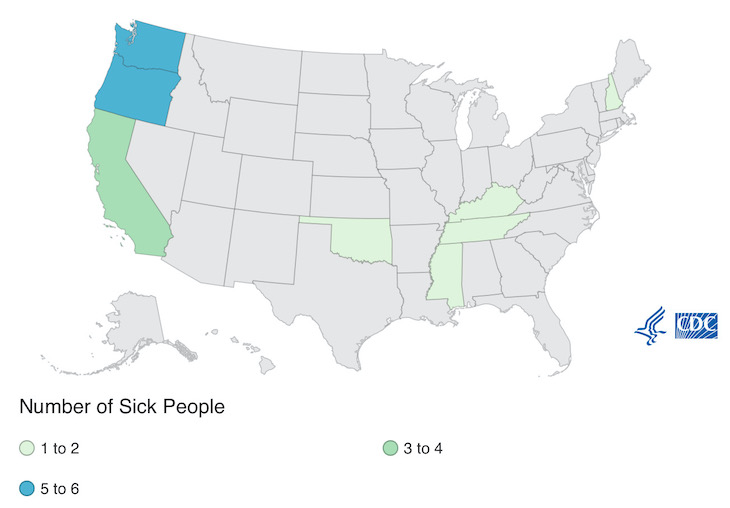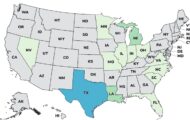A Salmonella outbreak linked to wild songbirds has sickened at least 19 people in 8 states, with eight of those patients hospitalized, according to an investigation notice by the Centers for Disease Control and Prevention (CDC). Last month, Food Poisoning Bulletin reported on the deaths of songbirds, particularly pine siskins, related to bird feeders in several states around the country.

Those bird illnesses and deaths are caused by the same strain of Salmonella that is now making people sick. Humans can get sick from contact with these birds, from contact with contaminated bird feeders, and from contact with animals who may play with or eat the birds.
As of March 30, 2021, the case count by state is: California (3), Kentucky (1), Mississippi (1), New Hampshire (1), Oklahoma (1), Oregon (5), Tennessee (1), and Washington (6). Oregon and Washington were the first states to notice this issue with wild birds.
The notice does state that this outbreak may not be limited to those states, since many people sickened with Salmonella infections do not seek medical care and are not tested for the pathogen. In fact, the notice states, “The true number of sick people in an outbreak is likely much higher than the number reported.”
The patient age range in this Salmonella outbreak linked to wild songbirds is from 2 months to 89 years. Of 17 people who gave information to investigators, 8 are hospitalized. No deaths have been reported. Of the 13 people interviewed, 9, or 69%, said they owned a bird feeder, and 2 (15%) reported contact with a sick or dead bird. Ten people have pets that had access to or contact with wild birds.
Whole genome sequencing taken from patient isolates showed that sick people’s samples are closely related genetically. And officials in Washington and Oregon collected samples from sick or dead wild pine siskins. They found that the Salmonella from the pine siskins are closely related to bacteria from sick people.
It’s important that people in states where dead birds are being found and where this outbreak has occurred take down their bird feeders. If you see a sick or dead bird in your yard, remove the feeders for two weeks and clean them outdoors before replacing them. If you find a sick bird, call your state wildlife agency. Do not touch it with bare hands.
The correct way to dispose of dead wild birds to wear gloves or place a plastic bag over your hand to pick it up. Put the bird in a plastic bag, tie the bag closed, and throw it away following the wildlife agency’s instructions. Then wash your hands thoroughly with soap and water.
It’s important to keep your pets away from bird feeders and bird baths and the areas under them. Pets can contract Salmonella and not show symptoms, but be able to pass the bacteria on to people.
Symptoms of a Salmonella infection include a fever, nausea, vomiting, abdominal and stomach cramps and pain, and diarrhea that may be bloody. These symptoms usually appear 6 to 72 hours after infection. If you have had contact with wild birds or bird feeders and have been sick with these symptoms, see your doctor. You may be part of this Salmonella outbreak linked to wild songbirds.




